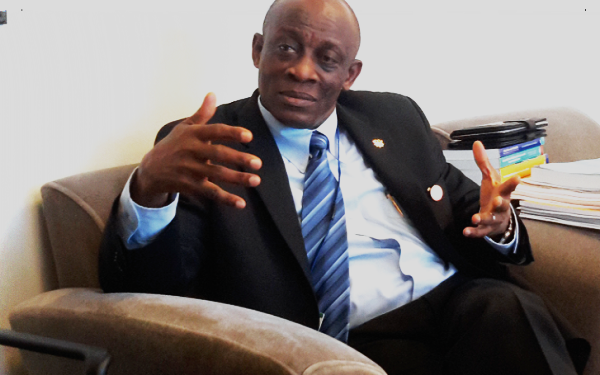E-Levy to add to distortion of stable tax structure regime – Seth Terkper
Erstwhile Minister for Finance, Seth Terkper, has said the introduction of the electronic transaction levy (E-Levy) will add to the distortion of the country’s current stable tax structure.
According to Mr Terkper, Ghana has a rational tax system which is currently being destroyed by the introduction of numerous taxes as well as the extension of temporary taxes like the ESLA.
“We have a very rational tax system which took us over 30 years to be streamlined and so let us not destroy it.
“Taxes such as the covid Levy, national fiscal stabilization levy, sanitation levy, financial sector levy, the blocking of the credit refund in the VAT for businesses and now the E-Levy are all distorting the tax structure and taking us back to the pre-VAT period where there were numerous and unstreamlined taxes in the system.
“We need a stable tax structure regime and the current tax structure comprising the excise, import, personal and corporate income taxes regime provides that,” he stated.
Mr Terkper made the above assertions speaking at the PFM Tax Africa’s 2022 first quarter economic dialogue on Ghana’s economic outlook for the 2022 fiscal year.
Speaking further on the E-Levy, Mr Terkper remarked that revenue accumulated from the levy will not be a solution to Ghana’s inadequate financing needs.
According to him, with a projected GHS 45bn deficit financing gap for this year, the projected GHs 6.9bn to be raked from the E-Levy will not resolve the fiscal challenges facing government.
“E-levy is not going to resolve the fiscal challenges facing government because there is a financing need of GHs 45bn for this year and E-Levy is going to give us only GHS 6.9bn.
“Granted the E-Levy is even allowed by the Minority to be implemented, it is still not the solution to the county’s financing challenges,” he noted, however, maintaining his stance that the E-Levy is regressive in nature.
Mr Terkper is of the view that to resolve the financing challenges of government, not only does government need to cut its expenditure (as indicated by the 20% cut in expenditure by the Finance Minister) but government must also manage its expenditure by particularly disallowing its agencies from spending beyond their approved budget.
Read: Osei Kwame Despite joins fray for new national airline
Passage of E-levy bill to ensure strong domestic revenue mobilization
Meanwhile, Finance Minister Ken Ofori Atta has said that government must remain focused in getting the E-Levy bill passed to ensure strong domestic revenue mobilization.
The Minister said this while answering questions at a press conference in Accra on Wednesday, January 19, 2022, on what the government’s Plan B is for the economy and revenue generation if the E-levy is not passed.
“There is no way we can have absolute agreement.
“We are going up by 40 per cent with regards to revenue mobilization and then expenditure is also going up by 25 per cent. We have always been very good about being able to to cut down on expenditure appropriately when we don’t meet our target.
“With this new dawn of GRA exceeding targets, we expect that to continue. With the new national ID system, now 15.5 million people are going to be on their books.
“That is what gives me the excitement into the future because when I read the Fitch Report, you are doubting that we can make our revenues but I am confident that we can. They are worried that we can’t come to the international market, we are saying its fine, we have our SDRs that will suffice for the first half and then we will figure out another method.
“So plan B is to stay focused and ensure that we get our E-levy through, ensure that our domestic revenue mobilization is strong and with that, we do not need to go the market.”
The E-levy proposal in the 2022 budget statement has sharply divided Parliament as the opposition MPs have rejected the proposal.
The Minority Leader Haruna Iddrisu said the policy proposal is a disincentive to the growth of the country’s digital economy.
To that end, he said, the Minority would not support it.
Read: Ghana Card: NIA urged to register more people following BoG directive to banks, SDIs, others
Speaking at a post budget workshop in Ho on Saturday November 20, he said, “Mr Speaker, understandably, we see that the Minister of Finance seeks to introduce some measures including the now popularly declared e-levy or digital levy as some have quite named it.
“Mr Speaker, our concern is whether the e-levy itself is not and will not be a disincentive to the growth of digital economy in our country . We are convinced that the e-levy may as well even be a disincentive to investment and a disincentive to private sector development in our country. We in the minority may not and will not support government with the introduction of that particular e-levy . We are unable to build national consensus on that particular matter.”
Finance Minister Ken Ofori-Atta announced this levy to be charged by government in 2022 on all electronic transactions to widen the tax net and rope in the informal sector.
“It is becoming clear there exists enormous potential to increase tax revenues by bringing into the tax bracket, transactions that could be best defined as being undertaken in the ‘informal economy,” Mr Ofori-Atta observed on Wednesday, November 17 as he presented the 2022 budget statement in Parliament.
“After considerable deliberations, government has decided to place a levy on all electronic transactions to widen the tax net and rope in the informal sector. This shall be known as the ‘Electronic Transaction Levy or E-Levy’.”
He explained that the new E-levy will be a 1.75 per cent charge on all electronic transactions covering mobile money payments, bank transfers, merchant payments and inward remittances to be borne by the sender except inward remittances, which will be borne by the recipient.
This will, however, not affect transactions that add up to GH¢100 per day.
“A portion of the proceeds from the E-Levy will be used to support entrepreneurship, youth employment, cyber security, digital and road infrastructure among others.”
In 2020, total value of transactions was estimated to be over GH¢500 million with mobile money subscribers and users growing by 16 percent in 2019.
According to a Bank of Ghana report, Ghana saw an increase of over 120 percent in the value of digital transactions between February 2020 and February 2021 compared to 44 percent for the period February 2019 to February 2020 due to the convenience they offer.









